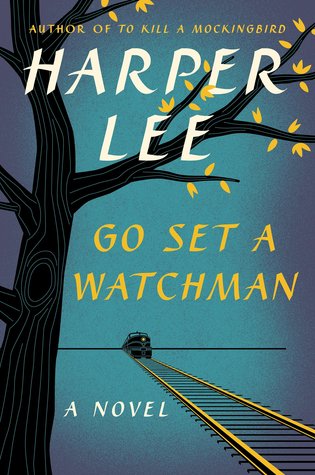Go Set A Watchman by Harper Lee
 Before I picked up Go Set A Watchman by Harper Lee, I read the media reports about the book’s questionable status as some sort of first, rejected version of the later Pulitzer Prize winner and I peeked at the pre-publication reviews that suggested Atticus Finch was not quite the man we admired in To Kill A Mockingbird.
Before I picked up Go Set A Watchman by Harper Lee, I read the media reports about the book’s questionable status as some sort of first, rejected version of the later Pulitzer Prize winner and I peeked at the pre-publication reviews that suggested Atticus Finch was not quite the man we admired in To Kill A Mockingbird.
As I came out of the bookshop at 8.30am this morning, clutching my copy of Go Set A Watchman by Harper Lee, I resolved to do two things: try really hard to like it despite the pre-publication negativity and to treat it as an entirely separate novel from Mockingbird. The characters might have the same names, I told myself, but that would be where the connection ended.
So this is how my resolutions went. I did like the novel, particularly the first half, when Lee shows her gift for gentle writing. She does delightful thumbnail character sketches. Of Atticus, she writes:
“On some days he wore two watches: he wore two this day, an ancient watch and chain his children had cut their teeth on, and a wristwatch. The former was habit, the latter was used to tell time when he could not move his fingers enough to dig in his watchpocket. He had been a big man before age and arthritis reduced him to medium size.” (p 17)
There are lovely touches of humour. For example, p 86
“’Mary Webster was on the blower. Her advance agents saw Hank and me swimming in the middle of the river last night with no clothes on.’
‘H’rm,’ said Atticus. He touched his glasses. ‘I hope you weren’t doing backstroke.’”
The first hundred pages are the gentle reminiscences of a young woman, living in New York and coming home to the South for her annual holiday. She becomes re-acquainted with her eccentric family and neighbours and resumes a hesitant romance with her long-term sweetheart. Jean Louise’s greatest dilemma is whether to marry Hank or continue with their slow courtship. But things take a sinister turn when she discovers that those she most loves and trusts read racists pamphlets and attend hate-fuelled citizens’ council meetings.
“Every nerve in her body shrieked, then died. She was numb.”(p 111)
The second half of the novel is not such an easy read, partly because of its stark subject matter but also because characters give long, intellectual and ideological speeches. This is what stopped me giving the book a four-star rating. I think I was at a disadvantage in not knowing much American history. Lee uses the character of Dr Finch, Atticus’s brother, as the sounding board for historical, religious and political debate. Jean Louise counters with her egalitarian views, challenging not only overt racism but also the subtler, for-their-own-good, paternalistic kind. But even she is a product of her time and stops short of the kind of equality we would expect today.
But what of my intention to divorce this novel entirely from Mockingbird? Well that didn’t work at all. The two are inextricably linked. On every page we are with Jean Louise, the grown-up version of tomboy Scout. She might be twenty six now but she’s still the bright, determined nine-year old we cheered for. Lee also gives us plenty of endearing flashbacks to Scout’s childhood games with brother Jem and neighbour Dill that provided much of Mockingbird’s charm.
And Atticus? Shockingly changed, beyond any self-respecting reader’s tolerance? Well, I think we need Atticus the perfect, courageous moral beacon of the first story to understand Jean Louise’s turmoil at finding her father rather different in the second. As Dr Finch tells her
“…We wondered, sometimes, when your conscience and his would part company, and over what.” (p 265)
Her outrage is our outrage. She waited twenty six years and we waited fifty five to realise:
“…you confused your father with God. You never saw him as a man with a man’s heart, and a man’s failings…” (p 265)
Read it and discuss it, not only as a literary phenomenon but also as a guide to set your moral watchman by.
Read my review here of Buffalo Soldier by Tanya Landman – another book that deals head-on with the cruelty and stupidity of racism.

Comments (0)